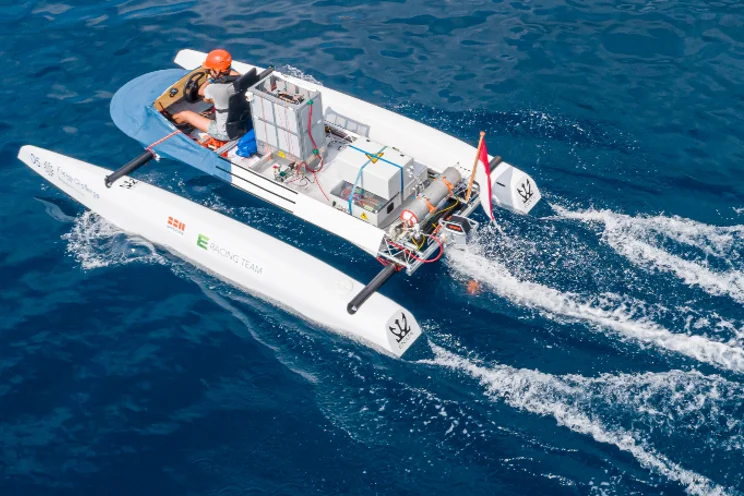An overview of Yacht Club de Monaco’s environmentally responsible initiatives

“Monaco’s future lies with the sea,” wrote Prince Rainier III, founder of the Yacht Club de Monaco, a sentiment that remains as relevant today, especially on the eve of United Nations World Oceans Day.
Under the Monaco Capital of Yachting project, initiated by its President HSH Prince Albert II, the Yacht Club de Monaco (YCM) actively supports initiatives aimed at protecting the marine environment. “More than ever before, we need to build the future through the prism of eco-responsibility. The yachting industry cannot evolve unless it incorporates the concept of sustainable development in every one of its initiatives. We are the heirs of a long tradition of innovation, dating back to powerboat meetings that allowed manufacturers to trial their latest advances in engine technology. It’s up to us to perpetuate this tradition and prepare the industry’s future,” explains Bernard d’Alessandri, General Secretary of the Yacht Club de Monaco.
Monaco Energy Boat Challenge: Engineering and Creativity for Eco-Responsible Yachts
Keen to play its role in shaping a sustainable future, YCM brings together industry players and the new generation of engineers for the eighth edition of the Monaco Energy Boat Challenge. The event aims to foster collaboration in developing greener alternative propulsion systems. This year, 32 teams, representing 22 universities and 16 nationalities, will converge on the quays and Monaco bay to unveil their latest innovations designed to optimize energy use and propulsion.
SEA Index: A Benchmark for Assessing Superyacht CO2 Emissions
In its ongoing effort to position Monaco as a center of excellence and innovation in the luxury yacht sector, YCM, in partnership with Credit Suisse, established the Superyacht Eco Association and its SEA Index. This rating system targets yachts over 40 meters by evaluating the CO2 emissions of their propulsion systems and generators. The first step to reducing emissions is to assess them—an essential measure for owners, captains, boatyards, and other stakeholders committed to improving the environmental performance of superyachts. The SEA Index offers a quick method to assess a yacht’s carbon footprint, with certificates issued by Lloyd’s Register, an independent globally recognized organization. The SEA Index is also used to determine the annual La Belle Classe Explorer Awards, presented by HSH Prince Albert II, honoring owners who have demonstrated a commitment to the marine environment in both the design and operation of their explorer yachts.
Smart Yachting & Marina: Creating Eco-Responsible Ports of Call
Under its La Belle Classe Destinations certification, the Yacht Club de Monaco aims to support the development of next-generation marinas that can accommodate tomorrow’s greener yachts.
“The entire yachting ecosystem needs to be mobilized. We want to support developments not only in how yachts are powered and good practices, but also to ensure these boats can call into virtuous marinas,” says Bernard d’Alessandri. The YCM will host the Smart Yachting & Marina meeting, supported by the Prince Albert II of Monaco Foundation and Extended Monaco, the Monaco Government’s digital transformation program. Organized by Monaco Marina Management, the event will bring together key players, investors, promoters, manufacturers, and innovators to develop eco-responsible, efficient, attractive, and user-friendly marinas. The day will be dedicated to high-level discussions between decision-makers across the ecosystem, focused on investing in innovations that address both business and environmental challenges. The most promising solutions will be highlighted to encourage their adoption, showcasing “Smart” technology in service of environmental protection.
Through these initiatives, the Yacht Club de Monaco is rapidly becoming a leading platform promoting an environmentally responsible approach to yachting. “By turning words into actions, these initiatives demonstrate how the Yacht Club de Monaco fulfills its mission to educate and support all relevant efforts to ensure recreational boats lead the way in sustainable development,” concludes Bernard d’Alessandri, emphasizing the need for everyone in the sector to be mobilized to protect the ocean.
 Albania
Albania Algeria
Algeria Andorra
Andorra Argentina
Argentina Armenia
Armenia Australia
Australia Austria
Austria Azerbaijan
Azerbaijan Bahrain
Bahrain Belgium
Belgium Bolivia
Bolivia Brazil
Brazil Bulgaria
Bulgaria Cambodia
Cambodia Cameroon
Cameroon Canada
Canada Chad
Chad Chile
Chile China
China Colombia
Colombia Costa Rica
Costa Rica Croatia
Croatia Cyprus
Cyprus Czechia
Czechia Denmark
Denmark Ecuador
Ecuador Egypt
Egypt Finland
Finland France
France Georgia
Georgia Germany
Germany Ghana
Ghana Greece
Greece Hungary
Hungary Iceland
Iceland India
India Indonesia
Indonesia Ireland
Ireland Italy
Italy Jamaica
Jamaica Japan
Japan Jordan
Jordan Kazakhstan
Kazakhstan Kenya
Kenya Kuwait
Kuwait Latvia
Latvia Lebanon
Lebanon Libya
Libya Lithuania
Lithuania Luxembourg
Luxembourg Malaysia
Malaysia Maldives
Maldives Mali
Mali Malta
Malta Mexico
Mexico Moldova
Moldova Monaco
Monaco Morocco
Morocco Netherlands
Netherlands New Zealand
New Zealand Nigeria
Nigeria North Macedonia
North Macedonia Norway
Norway Oman
Oman


